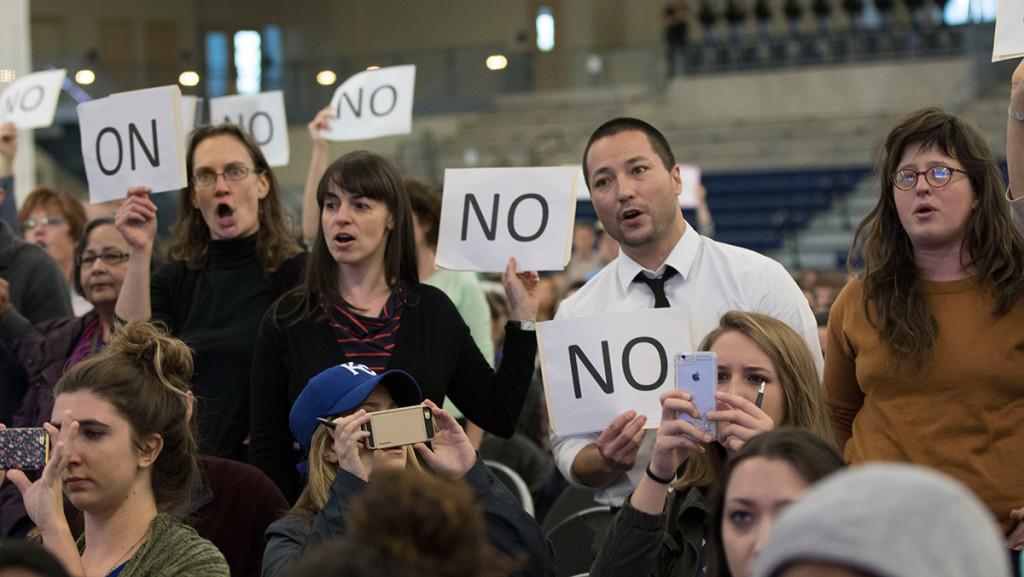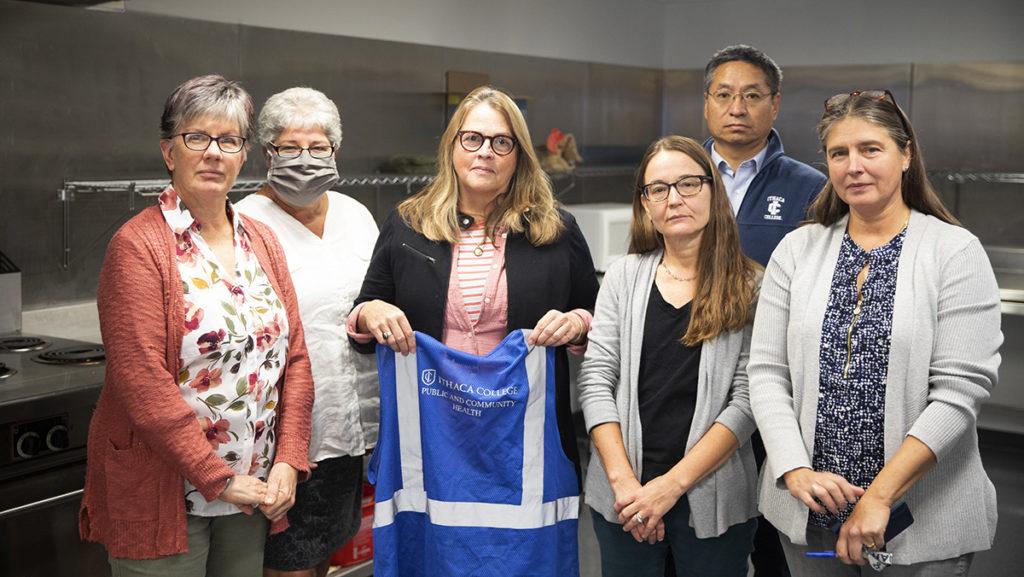The actions of President Tom Rochon over the last seven years have brought Ithaca College into a state of crisis and many faculty members have been left with grave doubts as to whether he can effectively address the dire situation in which we find ourselves. As our rationale for an all-college vote of no confidence, we focus upon two explicit failures of the President’s administration. The first is his inability to chart a consistent way forward for Ithaca College. Tom Rochon’s tenure has been characterized by a puzzling and capricious series of stops and starts, all of which call into question his competence as a visionary thinker and steward of the College. The Blue-Sky Reimagining event is only the most recent and glaring example, with its absence of any discernible intellectual content and its implicit and explicit disparagement of classroom and book learning. Its uninterrupted, flagrant racism, which in all likelihood would have been mitigated if the conversation had included at least one participant conversant in the world of higher education, was followed by a slow and clumsy response from the President, further aggravating campus unrest. Moreover, while the racist remarks by Chris Burch could not have been anticipated, the President showed poor judgment in placing a wealthy donor at the center of an event focused on a subject upon which Burch was ill-equipped to comment knowledgeably.
The Blue-Sky Reimagining enterprise was announced suddenly in the spring of 2015 without prior consultation with faculty, and it typifies the President’s habit of concocting visionary initiatives that turn out to be vaguely conceived and short-lived. Blue-Sky is just the most recent of a dizzying array of initiatives that the President has rolled out during his tenure at IC; others include IC-Squared, the Listening Sessions, IC20/20 and Imagineering. Apart from IC20/20, these initiatives have by and large proved to be momentary enthusiasms that have cost both time and money and to date have amounted to little. IC-Squared vanished without a trace. The Imagineering event, despite great fanfare, reaped no results, and its ostensible goal of providing a visible, physical presence for Academics and Academic Advising has seemingly dropped from the college agenda, without explanation. As for IC20/20 and Blue-Sky, they have now been “suspended” to allow the campus to focus upon (we agree) pressing and important racial issues. Nevertheless, the complete suspension of the other initiatives has left many faculty members all the more dubious about Blue-Sky’s significance and uncertain as to what it means to “suspend” a strategic plan. Perhaps it is the President’s view that we have achieved IC20/20’s key goals, but the announcement of a suspension sends an unclear message to the campus community. Meanwhile, the President remarked publicly at the fall 2015 all-college meeting that the master plan does not commit the college to any particular plan.
President Rochon’s inability to provide a consistent vision of Ithaca College’s future is further demonstrated by the fact that his own office is unstable and volatile, as manifested by the revolving door for Provosts and other high and mid-level administrators. Moreover, there is an annual dissonance between his call for fiscal prudence and the regular, end-of-year multi-million dollar surpluses, frustrating departments desperate for faculty lines and concerned about the lack of support for or elimination of programs. Each year begins with an announcement of a looming catastrophe–one year it was the MOOCS, another year it was the imminent decline in our enrollments (which was quickly followed by a surge in our enrollments), more recently it has been the high cost of tuition for students. The last claim in particular surely has credibility, but the perpetually changing justification for an endless state of fiscal alarm has forged widespread mistrust and left faculty and staff morale lower than anyone can remember seeing in many decades. Indeed, Rochon has created a culture of fear for faculty and staff by announcing alleged cost-cutting measures that are at once vague and draconian: such as vertical and horizontal cuts to programs—announced in 2012 and never officially retracted, though the numbers it was based on were when a faculty member showed them to be completely erroneous—and the 40+ staff cuts.
The second reason we bring this motion is the President’s failure to work productively with the faculty. Although President Rochon gives frequent lip service to collaboration and shared governance, he has responded with hostility to dissent and disagreement, and he has worked avidly to control the free flow of information. For example, in the weeks leading up to last spring’s part-time faculty vote to unionize, the administration put together a highly misleading “Union Choice” page which, many faculty believed, contained slanted talking points and links to anti-union propaganda. When faculty members criticized the page, Rochon published an op-ed piece in the Ithacan which contained the gratuitous accusation that these critics were trying to suppress free speech. Furthermore, when faculty members expressed concern about two controversial tenure decisions, in 2014 and 2015, Rochon attempted (unsuccessfully) to persuade Faculty Council to make a statement that would muzzle further expressions of dissent about ongoing tenure cases. Moreover, an edict issued by Rochon early in the 2012-13 AY sought to require all student media to route requests for interviews with administrators through the college’s office of Media Relations. An outcry ensued, with faculty and students coming together to resist this infringement upon intellectual freedom. After 5 weeks of protest, Rochon finally rescinded the order.
The faculty at Ithaca College supports immersive learning, high impact practices, and calls for self-examination, flexibility and change. But the faculty most committed to such practices report that they are regularly frustrated in their efforts by administrative units in PRW (such as Marketing Communication, Risk Management, Transportation and the Registrar’s Office) that are under the supervision of the President. These offices are perceived by many faculty as obstacles to the very student-centered environment we wish to create.
The President’s responsibilities, as defined by the Ithaca College Policy Manual, include “long-range and strategic planning” and “institutional, faculty and educational leadership” (1.4.1). As we hope this motion makes clear, President Rochon has failed conspicuously in these two crucial areas. To be sure, taken singly, some of the issues and actions listed above might be written off as one-time mistakes, lapses of judgment, or even defensible actions that were poorly communicated. But there has been such a notable accumulation of missteps over the years as to constitute a pattern of misjudgment and miscommunication that is detrimental to the College. President Rochon has shown a persistent inability to lead Ithaca College prudently, effectively, or collaboratively, and this inability has now reached a crisis point. The only responsible way forward, given these circumstances, is to allow the faculty to express its collective will through a vote of no confidence, and we call upon Faculty Council to do precisely that.
Respectfully,
The H&S Faculty Senate, on behalf of the H&S faculty











